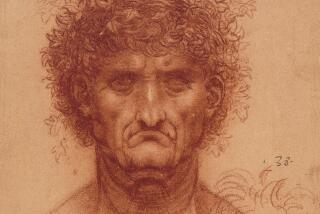Tarkovsky’s Sublime Visions of Longing
- Share via
The New Beverly Cinema, 7165 Beverly Blvd., will screen the late avant-garde Soviet filmmaker Andrei Tarkovsky’s “The Mirror” (1978) and “Nostalghia” (1984) Wednesday and Thursday. The title of the shimmering, enigmatic “The Mirror” could easily refer to art itself in its eternal function of holding up a reflection to human nature so that we may see ourselves in it. With Tarkovsky, however, there’s always a desire to see beyond this world into others--in this instance the past, evoked through memory, imagination and dreams.
Tarkovsky shifts between black-and-white and color, between past and present, in so intensely a personal way that it becomes beside the point--and also futile--to try to make distinctions. It’s best to go with the film’s gorgeous flow, connecting with it emotionally rather than rationally. “The Mirror” is above all an expression of longing for the past, specifically for a mother’s love (and trying to find it in a wife), and a return to a Garden of Eden-like existence. But this is also a film with a double vision: While expressing that childhood desire for security that seems to remain in us always, it perceives its people from an adult perspective, and for all its luminosity, some of its memories are fear-laden and tragic.
Tarkovsky’s films invite us to experience what we’re seeing, to perceive a universe in which the line blurs between the natural and the supernatural. This radiant, sublime dream of a film begins with a televised scene of a therapist in the process of curing a stuttering young boy. If we are to take this scene as a metaphor, then “The Mirror” can be regarded as the work of a man who has found his voice and learned to express himself in his own powerful way.
Tarkovsky felt that nostalgia has a richer, more complex meaning to Russians--”one that mixes the love of your homeland and the melancholy that arises from being far away.” Although the film is a profound expression of Tarkovsky’s own exile longings, it gives way to larger concerns when its poet-hero (Oleg Yankovsky), during an Italian odyssey, meets a “madman” (Erland Josephson) who protests against the disjointedness of society and professes the need to return to a simpler form of life. Above all, “Nostalghia” gives intense visual expression to the poet’s increasingly desperate search for meaning and for a reconciliation of past (Russia) and present (Italy). In its stately, measured way “Nostalghia,” in its culminating spirit of affirmation, becomes akin to a religious experience.
Information: (213) 938-4038.
The Evils of War: John Woo’s “Bullet in the Head” (1990), a powerful, dynamic variation on “The Deer Hunter,” returns Wednesday to the Monica 4-Plex for a one-week run. At once an epic adventure, war picture, gangster melodrama and buddy movie, it features three petty Hong Kong crooks who in 1967 take off for Vietnam, where wartime dangers are equaled only by the opportunities to acquire illicit fortunes; their fate symbolizes the evils of the war itself. Information: (310) 394-9741.
Senegalese Duo: The Beyond Baroque Literary Arts Center, 681 Venice Blvd., Venice, will present Ousmane Sembene’s “Black Girl” (1966) and “Borom Street” (1964) on Saturday at 8 p.m. What is so overpowering about both films is the understated matter-of-factness with which Sembene shows the casual cruelties and routine injustices that are the result of whites’ ancient oppression of blacks. Both have been made with unflinching directness and simplicity.
In the first, a beautiful young Senegalese woman (Nbissine Therese Diop) is hired in Dakar by a French couple to care for their three children. Unfortunately, she accompanies the family back to France, where she becomes a virtual slave, and her employers simply forget that she is a human being. It is Sembene’s major achievement that everything that happens is totally credible--that the French couple could be so thoroughly monstrous and exploitative without realizing it for a second.
“Borom Street,” a devastating portrayal of the evils of apartheid, will bring to mind “The Bicycle Thief.” In this 19-minute film, Sembene’s first, we meet a Senegalese cart man (Ly Abdoulaye) on his daily rounds. His troubles begin when he lets another black man persuade him to transport the man to the forbidden, magnificent white section of Dakar.
Information: (310) 822-3006.
More to Read
Only good movies
Get the Indie Focus newsletter, Mark Olsen's weekly guide to the world of cinema.
You may occasionally receive promotional content from the Los Angeles Times.








